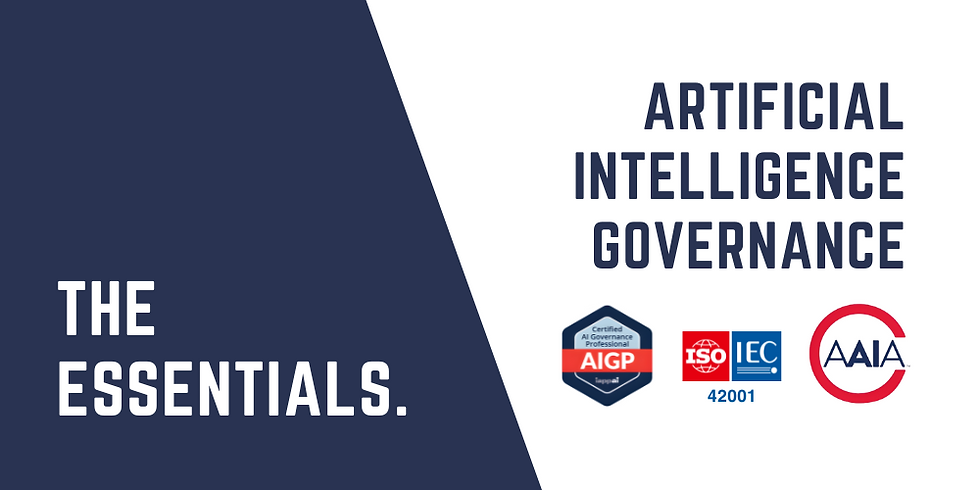Artificial Intelligence Governance | Essential Guide
- MENA Executive Training
- Jun 23, 2025
- 3 min read
Updated: Jun 25, 2025

As artificial intelligence becomes deeply embedded in how businesses operate, the need for AI governance has never been more urgent.
AI systems can drive productivity, automate decision-making, and uncover insights—but they also introduce serious risks: bias, lack of transparency, privacy breaches, and regulatory exposure.
AI governance refers to the structures, processes, and policies that ensure AI is developed and used responsibly, ethically, and in line with laws and stakeholder expectations. It's a fast-emerging discipline—and professionals across compliance, security, legal, IT, and innovation are now looking to build expertise in this space.
Below, we answer the most common questions about AI governance and compare three of the most recognised certifications in the field.
What Is AI Governance?
AI governance involves defining how artificial intelligence systems are managed, monitored, and held accountable throughout their lifecycle. This includes setting policies on fairness, safety, data integrity, explainability, human oversight, and compliance with AI laws and standards.
Why Is AI Governance Becoming Critical Now?
AI is no longer a backroom experiment—it’s running core processes in healthcare, finance, recruitment, and law enforcement. With the rise of regulations like the EU AI Act, OECD AI Principles, and ISO/IEC 42001, organisations must now show that their AI systems are trustworthy, documented, and compliant. Poor governance leads to reputational damage, legal penalties, and system failures.
Who Should Learn AI Governance?
AI governance isn’t just for data scientists.
It’s also highly relevant for:
Data protection and privacy officers
Risk and compliance managers
IT governance professionals
Security teams
Legal and policy advisors
Technology and innovation leadsAs AI becomes more regulated, organisations need multidisciplinary teams to oversee its development and use.
Is AI Governance Covered By Any International Standards?
Yes - ISO/IEC 42001 is the first official global standard for AI Management Systems (AIMS). It provides a framework for designing, implementing, and auditing responsible AI governance across organisations. ISO/IEC 42001 builds on the structure of other ISO management standards like ISO/IEC 27001 and ISO 9001.
What AI Governance Training Courses And Certifications Are There Currently?
As demand for AI governance expertise grows, several professional bodies now offer structured certifications that help individuals and organisations understand, implement, and audit AI governance practices.
Among the most recognised are:
AIGP by IAPP - focused on governance, privacy, and regulatory issues
AAIA by ISACA - focused on risk and control assurance in AI systems
ISO/IEC 42001 by PECB - focused on managing AI through formal ISO-based frameworks
These certifications vary in focus, depth, and target audience, which is why it’s important to choose the one that fits your role and organisation’s needs.
What’s The Difference Between AIGP, AAIA, And ISO/IEC 42001?
AIGP (IAPP) is designed for privacy, policy, and governance professionals who need to understand how to implement ethical and legal AI use within organisations. It's strong on regulation and organisational impact.
AAIA (ISACA) is more technical and audit-focused—ideal for professionals who need to assess or evaluate AI systems through a controls and assurance lens.
ISO/IEC 42001 (PECB) is the most comprehensive for organisations looking to implement an AI Management System. It teaches participants how to build, audit, or manage AI governance frameworks at scale, aligned to international standards.
Which Certification Should I Choose?
Choose AIGP if you work in privacy, governance, law, or compliance and want a well-rounded understanding of responsible AI use in the business and legal context.
Choose AAIA if your role involves risk assessment, internal audit, or assurance, and you're seeking to apply structured control evaluations to AI systems.
Choose PECB ISO/IEC 42001 if you need to implement or audit formal governance structures for AI across your organisation, especially in highly regulated or enterprise environments.
Final Thoughts
AI governance is moving fast from optional to essential. Whether you're navigating compliance, setting policies, or leading technical audits, the right training builds your credibility—and helps your organisation stay ahead of regulatory, reputational, and ethical challenges.





